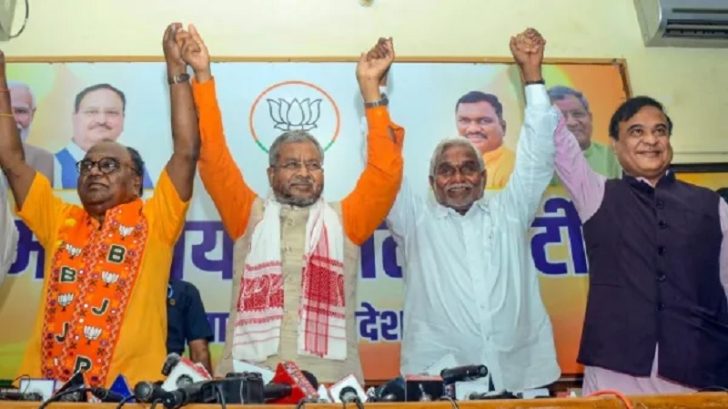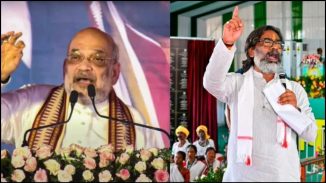Champai Soren, tenderly known as the “Kolhan Tiger,” has for quite some time been a vital figure in Jharkhand’s political scene, famous for his commitment to ancestral freedoms and his compelling job in the statehood development. His new renunciation from the Jharkhand Mukti Morcha (JMM) and choice to join the Bharatiya Janata Party (BJP) marks a huge defining moment in Jharkhand’s governmental issues. This move not just highlights the extending discontent inside the JMM yet in addition positions the BJP to benefit from the developing disappointment with the Hemant Soren-drove government.
On August 28, 2024, Champai Soren, the seven-term MLA from the Saraikela voting public, offered his abdication from the JMM, refering to his failure with the party’s heading and initiative under Hemant Soren. After months of internal strife, this departure demonstrates that the JMM leadership failed to address the concerns of senior leaders and preserve party unity.
Soren’s leave comes after he was casually taken out from his situation as Boss Pastor, following the capture of Hemant Soren on charges of illegal tax avoidance. How Champai Soren was sidelined-without even the kindness of earlier notification considers ineffectively the JMM’s interior vote based system and brings up difficult issues about its obligation to ancestral administration. Many people have voiced their disapproval of the JMM for its handling of the situation, with many of them claiming that the JMM engaged in nepotism and undermined the very leaders who have served as the foundation of the party’s support among tribal communities.
The most prominent example of Hemant Soren’s arrest by the Enforcement Directorate is the controversies and allegations of corruption that marred his tenure as Chief Minister. The Hemant Soren-drove government has been censured for its insufficient administration, inability to follow through on key commitments, and powerlessness to maintain the interests of the ancestral populace gives that Champai Soren himself has brought up as explanations behind his takeoff.
Under Hemant Soren’s initiative, the JMM has wandered from its center mission of upholding for ancestral privileges, zeroing in rather on combining power inside a little circle of followers. This shift hosts estranged numerous inside the gathering, prompting developing discontent among its majority. Champai Soren’s renunciation is an immediate incrimination of Hemant Soren’s authority, featuring the profound breaks inside the JMM and raising questions about its capacity to hold the trust of ancestral citizens in the impending races.
As the party seeks to increase its influence in Jharkhand, Champai Soren’s decision to join the BJP is a significant coup. With Soren’s standing as a firm backer for ancestral privileges, the BJP presently has a strong partner who can assist the party with interfacing with ancestral citizens in key locales like Kolhan and South Chota Nagpur, where the JMM has generally held influence.
It is anticipated that Soren’s move will significantly alter Jharkhand’s electoral dynamics. His well established associations in the Kolhan area and his impact among the ancestral networks make him a priceless resource for the BJP. By uniting with Champai Soren, the BJP is ready to make critical advances into the JMM’s conventional vote bank, possibly prompting a discontinuity of the ancestral vote that could shift the equilibrium for the BJP in firmly challenged electorates.
In addition, the addition of Soren’s endorsement of the BJP’s position on crucial issues like the threat of Bangladeshi infiltration gives the party’s campaign a new dimension. Champai Soren has freely expressed that “the presence of tribals is in peril because of Bangladeshi penetration,” repeating the BJP’s well established worries about the effect of unlawful migration on the nearby populace. His support for the BJP on this issue is likely to be appreciated by tribal voters, bolstering the party’s standing in the state.
The JMM’s reaction to Champai Soren’s renunciation has been dreary, mirroring an initiative that is withdrawn from its own base. Rather than tending to the genuine complaints raised by Soren and other displeased pioneers, the JMM has multiplied down on its separate methodology, further distancing key sections of its help base.
The party’s dependence on dynastic legislative issues and its inability to support new authority have left it defenseless against surrenders and interior dispute. The departure of Champai Soren could set off a series of similar departures by other disillusioned leaders. This potential for additional rebellions represents a serious danger to the JMM’s solidness and constituent possibilities, especially in the ancestral ruled locales that have generally been its fortress.
The Bottomline: A Defining moment for Jharkhand Governmental issues
Champai Soren’s exit from the JMM and his resulting arrangement with the BJP marks a huge defining moment in Jharkhand’s political scene. For the BJP, this improvement gives a competitive edge, reinforcing its effort to ancestral networks and upgrading its possibilities in the impending state decisions. For the JMM, Soren’s flight is a distinct indication of the party’s developing weaknesses under Hemant Soren’s initiative. The aftermath of Champai Soren’s resignation will likely have a significant impact on voter sentiment as Jharkhand prepares for its next election. The BJP, with its new partner, is strategically situated to gain by the JMM’s inner unrest and present itself as a reasonable option in contrast to an administration that has progressively moved away from the necessities and yearnings of Jharkhand’s ancestral networks.




